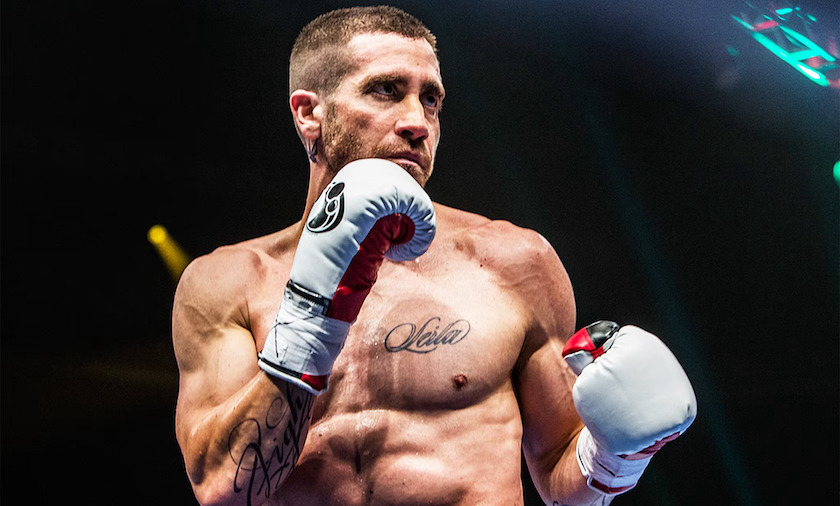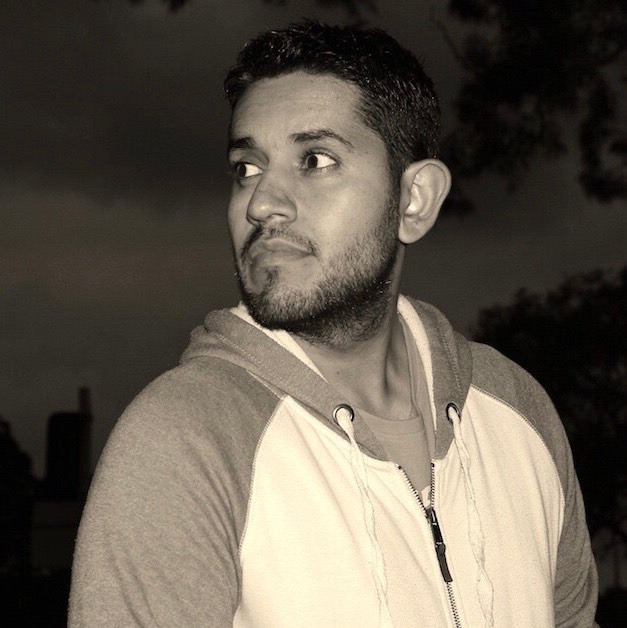
There’s something about the well-made boxing film that really taps into our desire to see someone rise from the bottom. Whether it’s from rags to riches or in this case from riches to rags and the struggle back again, seeing a boxer swinging those literal and metaphorical punche can work a treat. And while Antoine Fuqua’s Southpaw doesn’t quite hit the same dramatic heights of Martin Scorsese’s Raging Bull or have quite the inspirational oomph of John G. Avildsen’s Rocky, it stands tall as a gritty and stirring journey of a self-destructive man aiming to get his life back on track.
Jake Gyllenhaal plays Billy Hope, Light Heavyweight Boxing Champion of the World and happily married father of a young daughter (Oona Laurence). The film establishes Hope’s life quickly, opening with a fight to show his cocky and furious fighting style, and then moving on to show his strong relationship with wife Maureen, beautifully played by Rachel McAdams. He’s successful, no question about it, something his manager (Curtis “50 Cent” Jackson) has played a hand in and profited from greatly.
First and foremost, it’s the relationship between Billy and Maureen that wonderfully establishes what it is our protagonist will soon lose. There’s plenty of chemistry between Gyllenhaal and McAdams, driving home their scenes and absolutely convincing you of a relationship that, as we learn early on, blossomed from when the two were only young. They’ve both come from the bottom, and Maureen’s been the rock that Billy has held onto for quite some time. When tragedy strikes, Billy’s world is completely taken out from underneath him, leaving him in on a path of self-hatred and self-destruction, and leaving him at risk of losing absolutely everything he holds dear.
Let’s be clear, there’s a plethora of tropes almost every which way you turn here. We’ve seen this type of story told in a variety of ways, and the underlying structure is one we know well. Yet, it’s the strengths of the elements placed on this familiar canvas that manages to have you invested emotionally. One of those elements: Gyllenhaal. The actor is firing on all cylinders in Southpaw, putting in one hell of a physical performance, exuding aggression and brute strength in equal doses, and all the while carrying a tangible level of devastation and weakness. It’s a fantastic turn. Special mention also goes to young Laurence, in a believable and emotional performance that belies her age.
Director Fuqua has certainly shown his comfort with depicting resilient men in tough situations (Training Day, Shooter, Brooklyn’s Finest, The Equalizer), and he’s right at home here, working off a strong script from Sons of Anarchy creator Kurt Sutter. Together, Fuqua and Sutter push the story’s grittier aspects, delivering confronting scenes with energy and conviction. They believe in their story, and it comes through. Mind you, while the film’s pacing generally works well, there’s an obvious sag in the film’s middle section that slows down the film and would have benefited from a trim.
Of course, you’re also here for the boxing, and Fuqua, director of photography Mauro Fiore (Avatar, Spider-Man: No Way Home), and editor John Refoua (Avatar, The Magnificent Seven) absolutely nail the scenes in the ring. Don’t expect a ton of fighting in Southpaw, but do expect some great cinematic rounds. Wide shots, extreme close ups, slow motion and a focus on body deterioration; there’s a lot going on in the tightly constructed matches to ensure we’re as close to the action as possible. You’ll almost taste the sweat.
Southpaw brings to life a recognisable story in hard-hitting fashion. Gyllenhaal’s hard work is clear, and it’s paid off. Billy Hope’s fall and struggle to get back up hits the right emotional notes, countering a string of clichés with a combination of strong performances, a focused screenplay and a great deal of heart.

‘Southpaw’ is currently streaming on Netflix – you can watch it right HERE.










